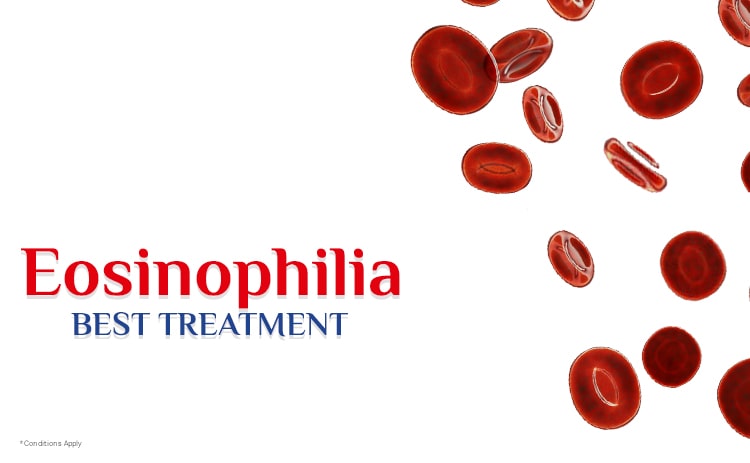
Eosinophilia
Eosinophilia is the state of having a high concentration of eosinophils (eosinophil granulocytes) in the blood. The normal concentration is between 0 and 0.5 x 109 eosinophils per litre of blood. Eosinophilia can be reactive (in response to other stimuli such as allergy or infection) or non reactive.
The release of interleukin 5 by T cells, mast cells and macrophages stimulates the production of eosinophils.
Diseases that feature eosinophilia:
- Allergic disorders
- Asthma
- Hay fever
- Drug allergies
- Allergic skin diseases
- Pemphigus
- Dermatitis herpetiformis
- Parasitic infections
- Some forms of malignancy
- Hodgkin’s lymphoma
- Some forms of Non-Hodgkin lymphoma
- Systemic autoimmune diseasess
- Some forms of vasculitis
- Cholesterol embolism (transiently)
The symptoms of eosinophilia are those of the underlying condition. For example, eosinophilia due to asthma is marked by symptoms such as wheezing and breathlessness, whereas parasitic infections may lead to abdominal pain, diarrhoea, fever, or cough and rashes.
Medicine reactions often give rise to skin rashes, and they often occur after taking a new drug.
Rarer symptoms of eosinophilia can include weight loss, night sweats, lymph node enlargement, other skin rashes, and numbness and tingling due to nerve damage.
Hypereosinophilic syndrome
Hypereosinophilic syndrome is a condition where there is no apparent cause for eosinophilia.
This rare condition can affect the heart, resulting in heart failure with breathlessness and ankle swelling, cause enlargement of the liver and spleen, resulting in swelling of the abdomen, and give rise to skin rashes.
Eosinophilia-myalgia syndrome (EMS) is an incurable and sometimes fatal flu-like neurological condition that is believed to have been caused by ingestion of poorly produced L-tryptophan supplements. Similar to regular eosinophilia, it causes an increase in eosinophil granulocytes in the patient’s blood
If Ignored
Left untreated, the condition can lead to narrowing of the esophagus and severe difficulties swallowing. Treatment options vary, but there exists no cure. … The condition, a chronic allergic inflammatory disease of the esophagus, is caused by an overgrowth of white blood cells called eosinophils.
Locate Positive Homeopathy clinics / doctors for EOSINNOPHILIA treatment. Click here to Book an Appointment today.
Frequently Asked Questions
What does a high eosinophil count mean?
Eosinophils are a type of disease-fighting white blood cell. This condition most often indicates a parasitic infection, an allergic reaction or cancer. You can have high levels of eosinophils in your blood (blood eosinophilia) or in tissues at the site of an infection or inflammation (tissue eosinophilia).
What causes eosinophils to be high?
Parasitic diseases and allergic reactions to medication are among the more common causes of eosinophilia. Hypereosinophila that causes organ damage is called hypereosinophilic syndrome. This syndrome tends to have an unknown cause or results from certain types of cancer, such as bone marrow or lymph node cancer.






